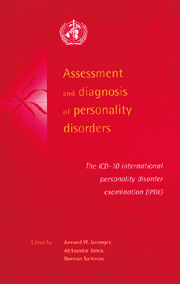 Assessment and Diagnosis of Personality Disorders
Assessment and Diagnosis of Personality Disorders Book contents
- Frontmatter
- Contents
- Contributors
- Preface
- Acknowledgements
- I Background and Field Trial
- Background
- Problems in the field of personality disorders
- Review of diagnostic instruments for the assessment of personality disorders
- Epidemiology of DSM-III personality disorders in the community and in clinical populations
- International personality disorder examination (IPDE)
- Experiences with the IPDE
- Field Trial
- II International personality disorder examination (IPDE) ICD-10 module
- Index
Experiences with the IPDE
from Background
Published online by Cambridge University Press: 04 August 2010
- Frontmatter
- Contents
- Contributors
- Preface
- Acknowledgements
- I Background and Field Trial
- Background
- Problems in the field of personality disorders
- Review of diagnostic instruments for the assessment of personality disorders
- Epidemiology of DSM-III personality disorders in the community and in clinical populations
- International personality disorder examination (IPDE)
- Experiences with the IPDE
- Field Trial
- II International personality disorder examination (IPDE) ICD-10 module
- Index
Summary
Personality disorders (PDs) have been considered among the least reliable diagnoses in psychiatry. When DSM-III PD diagnoses are made by clinicians, their reliability has proved to be rather poor. The development of structured interviews for PD was, therefore, the natural next step in an effort to improve reliability. Loranger et al. developed the Personality Disorder Examination (PDE) to fill that need. The IPDE evolved from the PDE, and includes the PDs in both ICD-10 and DSM-III-R. Its features are described elsewhere in this monograph.
After the completion of the International Pilot Study of Personality Disorders (IPSPD), the interviewers completed a questionnaire about their experiences with the IPDE. At a meeting of investigators in Geneva in 1991, considerable time was devoted to issues raised by responses to the questionnaire. We will present the main findings and solutions chosen, since they reflect the dynamic process involved in the development of the final version of the IPDE.
Some centres sent a common reply to the questionnaire, while others provided the responses of the individual interviewers. They revealed a variety of experiences and attitudes towards the instrument and the problems in diagnosing PDs. They are reviewed question by question.
What is your general impression of the IPDE?
The overwhelming majority of the respondents found the IPDE to be a useful instrument for diagnosing PDs. One could perhaps argue that this was inflated, because they had a major investment in the instrument.
- Type
- Chapter
- Information
- Assessment and Diagnosis of Personality DisordersThe ICD-10 International Personality Disorder Examination (IPDE), pp. 52 - 56Publisher: Cambridge University PressPrint publication year: 1997
